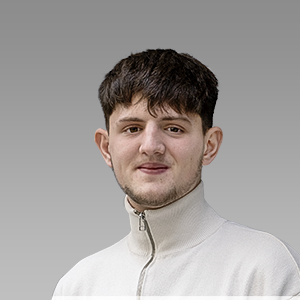 Kimi Weibel is doing his apprenticeship at Karger as a commercial specialist. To learn about different units, he changes departments every half year and he is currently in the marketing team. Find out more about his ever-changing routine and much more.
Kimi Weibel is doing his apprenticeship at Karger as a commercial specialist. To learn about different units, he changes departments every half year and he is currently in the marketing team. Find out more about his ever-changing routine and much more.
Take us through a day in your work life. What are some of the work habits you’ve developed over the years that help you maintain productivity?
I am doing my apprenticeship at Karger as a commercial specialist (Kaufmännischer Fachmann EFZ). To learn about different units, I change departments every half year, so my routine has to change accordingly.
But I established a morning routine that works quite well for me:
I always begin between 7:30 a.m. and 8:00 a.m., then I get the mail and distribute it to my colleagues and fill my water bottle. After this I check my mails and my calendar and finally start to work.
During my workday I have several meetings and I schedule in some time to work on my projects. I like to listen to music when I’m working on the latter.
What motivated you to apply for a position at Karger?
I saw that Karger is represented internationally in multiple countries and found this very exciting. I had known for a long time that I would like to start an apprenticeship as a commercial specialist. Medicine has always interested me very much and so Karger was the perfect fit for me.
What has been your experience during the remote working over the last two years?
I became more independent and liked the new flexibility. I also thought it was great to not have to commute every day and to be already at home as soon as my working day was over.
But I missed the personal exchange with my team; seeing everybody only through Microsoft Teams is not the same.
What do you enjoy the most about your time at Karger?
I appreciate that as an apprentice I get to know many different departments, so I can understand Karger’s operations much better and learn how a business really works (from Marketing to Sales and from Accounting to Shipping).
What would you like someone who’s interested in applying to Karger to know?
I would tell them that they will be great here and they will have an awesome time at Karger. They will have nice experiences and an interesting day at work, learn many things and find new friends. There are other people doing an apprenticeship at Karger, for instance in IT or also as a commercial specialist, so there are many peers in my age group.
How do you switch off from a busy day at work?
I do a lot of sports, play soccer, and go to the gym. Music often helps to switch off from a hard day. But fortunately, most of the days are interesting, challenging, yet at a good level.
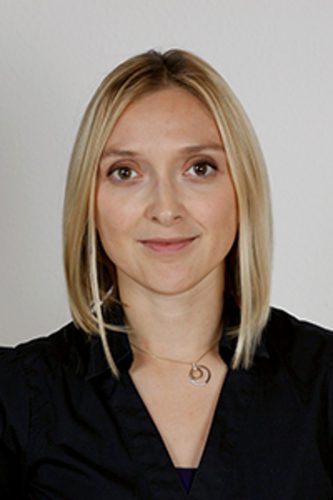 Setting daily goals, working in a startup-like atmosphere, and combining three lively kids and a job: Meet Sonja Mysicka and learn more about her job in the Education & Learning unit.
Setting daily goals, working in a startup-like atmosphere, and combining three lively kids and a job: Meet Sonja Mysicka and learn more about her job in the Education & Learning unit.
Take us through a day in your work life. What are some of the work habits you’ve developed over the years that help you maintain productivity?
On some days, my work revolves around product management tasks, which are fast-paced and interactive with contacts in and outside the company. On other days, the course creation is in focus, or I support the unit by researching and sharing insights on current topics – for example, finding innovative ways to make andragogy (adult education) more engaging and efficient with the help of technology. This is a quiet and focused type of work. I try to alternate between both. As a team, we support each other, so I will jump on board my colleagues’ projects if a tight deadline needs to be met. Every day is different. In the morning, I define three tasks that I commit to completing no matter where the day takes me. It might not sound like much, but it helps with prioritizing and feeling accomplished at the end of the day.
What motivated you to apply for a position at Karger?
As a psychologist, I am especially interested in health science and in education and learning. I am also a mom of three lively children, I’m fascinated by observing little humans learn. They have fun and learn effortlessly. Adults must put in more effort and carve out time in their busy schedules. Creating products that make the learning experience efficient, engaging, and yes, fun, is fulfilling to me. Another major factor is that Karger is a family-friendly employer. I work part-time and beyond that, Karger offers day-to-day flexibility, which makes it possible for me to balance my family and work obligations.
What has been your experience during the remote working over the last two years?
We have already had SharePoint and Teams set up and were quickly equipped with the hardware, so the technical side worked perfectly. I give great compliments to the Karger IT department for that. I profited from not having to commute, flexibility juggling work and family during the lockdown, and I could concentrate on some tasks better at home. However, I have missed in-person meetings, chatting with my colleagues over coffee, and attending congresses. A mixed model, which I get to do now, is ideal for me.
What do you enjoy the most about your time at Karger?
The way we work feels like a startup but with the benefits of a well-established and highly respected publisher. We apply the “fail fast to learn faster” approach. It is a fun and dynamic way of working.
What would you like someone who’s interested in applying to Karger to know?
As I have already mentioned, Karger is a truly family-friendly company (for moms and dads). Karger also actively supports employees in their further development with a lifelong learning program. The employees are encouraged to request further training if the content is not already offered in some shape or form. It includes not only developing work-related skills but also well-being.
How do you switch off from a busy day at work?
I do sports with my family. We enjoy skiing, swimming, waterskiing and tennis. Doing arts and crafts with my kids is another activity that helps me wind down. I give them an initial idea and some material, then lean back and look at them go (just stopping them before they dye the curtains).
Are you interested in a career at Karger? Explore our current job opportunities at our job portal. Also, find out what Mike does in the role as the “Head of Regional Office, Distributor & Agent Management”.
How is it possible to manage people from 15 different countries with multiple cultural backgrounds, time zones, languages, and working traditions? As Karger’s Head of Regional Office, Distributor & Agent Management, Mike Petersen does exactly this. What does his working day look like? How does he get motivated each day, and how does he not get confused by so many time zones? Let’s find out.
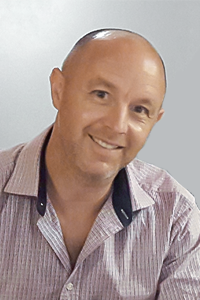 Take us through a day in your work life. What are some of the work habits you’ve developed over the years that help you maintain productivity?
Take us through a day in your work life. What are some of the work habits you’ve developed over the years that help you maintain productivity?
There isn’t a normal day as Head of RODAM, however a pattern that has naturally emerged is I typically start in the east and flow westwards. Given the locations of our Regional Offices (RO), it’s not unusual to start somewhere in Asia at 7-8 am and end my day conversing with either RO North America or LATAM.
I’ve always worked in an international capacity of some description, so the two most productive things that I’ve learned are patience and conducting business in a fluid manner; what we expect or experience in a ‘Western’ business world isn’t always what we experience elsewhere.
In terms of habits, I would simply say being curious about how business is done in other parts of the world, and by proxy applying what I’ve learned from one country or culture and integrating it with others.
What motivated you to apply for a position at Karger?
Pull up the sofa… how much time do you have? The chance to work in a truly global capacity, and influencing the strategy and direction of well-established and highly respected publisher.
What has been your experience during the remote working over the last two years?
Because my team is 95% international, my experience has been outstanding. I work with people from Brazil to Australia, and all points in between. It doesn’t really matter where I’m based, my team are scattered to all corners of the world, as long as I’m connected I can engage with them. HOWEVER! I sure have missed in-person contact; as much as I’ve thoroughly enjoyed working from home, boy, there have been days when my office has seemed incredibly small and isolated.
What do you enjoy the most about your time at Karger?
The diversity of my working day, literally no two days in a single week since joining Karger have been the same. This has no doubt been my saving grace during the pandemic.
What would you like someone who’s interested in applying to Karger to know?
As a family-owned medical research publisher, Karger is the perfect combination of a “not-for-profit publisher” mentality and commercial publisher mentality – we know what it is we want to achieve but we take a very considered and flexible approach to achieving it.
How do you switch off from a busy day at work?
Joining my Zwift cycling club (EVO) for live & virtual cycling, and my local cycling club (the Histon & Impington Bike Club – HIBC) as often as I can, and my kids!
What inspires you every day?
My four perfect and highly inspiring children mean the world to me – everything I do, I do for them. A wise man once told me: “whatever you do in your life, make sure you can keep up with your kids” – great advice, Dad!
Are you interested in a career at Karger? Explore our current job opportunities at our job portal. Also, find out what Nives does in the role as the “Community Insight Specialist”.
Regular nut consumption has a positive effect on chronic kidney disease and mortality in the United States, a recent study published in our American Journal of Nephrology shows. This is a promising discovery.
Several studies have already shown that nut consumption may have a favorable effect on cardiovascular health. The recently published study Nut Consumption and Effects on Chronic Kidney Disease and Mortality in the United States demonstrates the benefits of nuts for chronic kidney disease (CKD) prevention.
According to the National Institute of Diabetes and Digestive and Kidney Disease, diabetes and high blood pressure — two very common illnesses in the United States and increasingly in Europe and Asia – are the leading causes of chronic kidney disease. The Center for Disease Control and Prevention (CDC) estimates that 1 in 3 Americans suffer from pre-diabetes, and nearly half of all American adults suffer from hypertension. More than 37 million Americans suffer from CKD, 15 percent of the population (estimation from 2019).
Diabetes and its Effects
In a single generation, the number of people with Type 2 Diabetes has quadrupled (source WHO). Unlike many other known illnesses, it could affect the whole body and every organ system as small and large blood vessels get damaged over time. This results in visual problems, chronic kidney disease, polyneuropathy, and atherosclerotic plaque that can impact heart, brain, and legs (peripheral vascular disease) among other organs.
High blood pressure is the second leading cause of CKD. It also has an effect on blood vessels as it constricts, narrows, and eventually damages them throughout the whole body (including in the kidneys).
The Metabolic Syndrome
According to a study also published in the American Journal of Nephrology, metabolic syndrome is associated with chronic kidney disease (Metabolic Syndrome, and Not Obesity, Is Associated with Chronic Kidney Disease). Metabolic syndrome, formerly called Syndrome X, is a group of conditions including high blood pressure, high blood sugar, high triglycerides, abnormal cholesterol, and excess body fat around the waist. When patients experience 3 or more of these conditions, they suffer from metabolic syndrome, like almost 30 percent of adult North Americans. The main cause is hyperinsulinemia (read more about it). Hyperinsulinemia is the condition in which excess amount of insulin circulates in the blood.
Dietary Fat and Insulin Stimulation
Of the 3 macronutrients (carbohydrates, proteins, and fat), dietary fat stimulates insulin the least. Olive oil, butter, or other pure fats trigger almost no insulin release. Replacing some refined carbohydrates (such as in carbonated soft drinks, sugary snacks or convenience foods) with natural fats seems an easy approach to reducing insulin. Natural fats (found for instance in nuts, fatty cold-water fish, butter, olive oil, and avocado) raise blood glucose level very little, hence the body releases much less insulin.
Significant Results in the New Study
Above, we covered the main causes of chronic kidney disease and the link between insulin stimulation and diet, and we noted that natural fats reduce insulin release and are therefore beneficial for preventing or reducing diabetes, hypertension, or metabolic syndrome (which are all potential causes of chronic kidney disease). Nuts not only are sources of unsaturated fat, but they also seem to maintain a gut microbiota balance and help with bowel health. Different nut components may help improve hypertension. Nuts could also reduce inflammation Yao, Ge, et al. speculate that the anti-inflammatory effects that nuts show in other diseases may also help reducing glomerular injury and even slow the progression of chronic kidney disease). Nuts may improve lipid metabolism disorders because they are rich in unsaturated fatty acids. The study recommends consumption of 1-6 times per week. A higher frequency could be hazardous for patients with chronic kidney diseases but beneficial for people not suffering from chronic kidney disease.
3 Take-Away Tips for You
- Eating nuts 1-6 times per week
- Avoid refined carbohydrate and choose food containing unsaturated fats
- Avoid processed foods
If you would like to read the article, you can find it here.
Recommended Easy Reads for Those Affected
Diabetes:
High Blood Pressure:
Chronic Kidney Disease:
There are different ideas about what we, a scientific publisher, actually do. Let us share some of the misconceptions we often hear.
“Do you have insights for the book I’m currently writing?” Working for Karger Publishers often comes with the task of explaining what a publishing house in Health Sciences does. People tend to only focus on the terms “medical” or “publishing”. If they hear “medical”, they automatically think that we are all very intelligent and highly educated in natural science (which we of course are 😉) or if the emphasis is on “publisher” they ask us for publishing hacks. In reality, it’s neither. We not only publish medical journals, but also support researchers in their publication journey, make scientific findings easily understandable for healthcare providers, patients, and their caretakers, and provide a lot of different digital products and services.
In the graphic below we have collected some common misconceptions that we encounter as a scientific publisher based in Basel, Switzerland.

Did we miss anything? Share your impressions in the comments.
Get to know a typical work day of our Head of Digital Landscape: Adrian Harper. Learn about his “Getting Things Done” approach, why he still uses pen and paper, and how he optimizes his media consumption through AI.
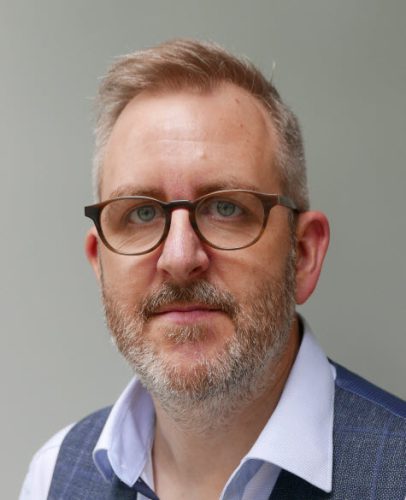 Take us through a day in your work life. What are some of the work habits you’ve developed over the years that help you maintain productivity?
Take us through a day in your work life. What are some of the work habits you’ve developed over the years that help you maintain productivity?
With responsibilities covering both internal and customer platforms, no two days are the same. I switch rapidly between overseeing the traditional areas of IT (software development, onsite and cloud infrastructure, security, data growth, and operational services), keeping major project initiatives on track, dealing with crisis incidents, and driving strategic discussions on how we use and develop our technology platforms.
My main productivity habit is the GTD methodology (Getting Things Done). I’ve trusted and relied heavily on this system since I first found David Allen’s book around 2004. Rather than take notes on a laptop, I use paper and pen in meetings, but any actions that I need to deal with are rapidly input into my GTD system when back at my desk.
When working at the office, I have a two-hour-plus commute time in the car; I find this time helpful to sort out my thoughts on what is coming up or what has happened during the day. This process typically generates a lot of ideas and actions that I dictate into my GTD system via my phone.
What motivated you to apply for a position at Karger?
I was approached to join the Karger team at a time when I had worked for over twenty years in the finance sector. The role at Karger offered me a real challenge combined with a very different industry to learn.
What has been your experience during the remote working over the last two years?
I’m fortunate to have space for a dedicated office at home, so I fully understand that I’ve been in a privileged position compared to many others who have struggled at kitchen tables. Although some of our staff switched between the office and home working over the last two years, I was one of a small number permanently at home from around February 2020. I estimate that I visited the office for only two or three days in that period.
Having worked remotely at least one day per week before the pandemic, moving entirely to remote work was not difficult. My wife, kids, and pets certainly appreciated that I was at home more and was much more flexible with my time, e.g. not leaving the house at 6 am to beat the commute traffic.
The thing I missed most during the pandemic was personal face-to-face discussions with my team members and the short exchanges at the coffee machine or in the hallway. Brainstorming and incident/crisis management are also very challenging when the team is remote.
What do you enjoy the most about your time at Karger?
I love the variability and the constant challenge of my role that stems from Karger, along with the scientific publishing industry, undergoing a significant period of change. This generates many new projects, changing processes, and new developments. I also enjoy the diversity of opinions and backgrounds of both my teams and colleagues. For a recent interview, I worked out that I had nine or ten different nationalities and an age range from sixteen to sixty-four within my teams.
What would you like someone who’s interested in applying to Karger to know?
While the expectation of Karger employees is high, the company also take the health and wellbeing of our people very seriously. The way the company reacted in an employee-first manner during the pandemic was exemplary, overcoming serious workflow, technical, and process issues to ensure that the Karger was ahead of the curve in reacting to guidance and regulations from the Swiss and overseas governments.
Seeing the success of allowing people more flexibility and the ability to work from anywhere accelerated Karger’s plans for full hybrid working and broke the traditions of always being in the office and block-time working that many Swiss companies still maintain.
What kind of media are you consuming every day?
I tend to consume quite a lot of media each day, so I try to optimise my consumption as much as possible. Through a reading system with a built-in AI, I collect news articles and alerts from hundreds of sources and then filter these to highlight trends and the specific topics I’m interested in following. I also read many books each year across lots of genres. I split my reading between an e-reader and audiobooks that let me utilise some of my commute time or time spent walking the dog etc.
Are you interested in a career at Karger? Explore our current job opportunities at our job portal. Also, find out what Samuel does in the role as an “Executive Assistant/Rights & Permission Manager”.
What does someone in the Strategy, Innovation & Venture (SIV) Department of our company actually do from day to day, you might wonder? We wanted to know from Stephanie Biller what her daily work day looks like and why collegiality and teamwork is especially important in her team.
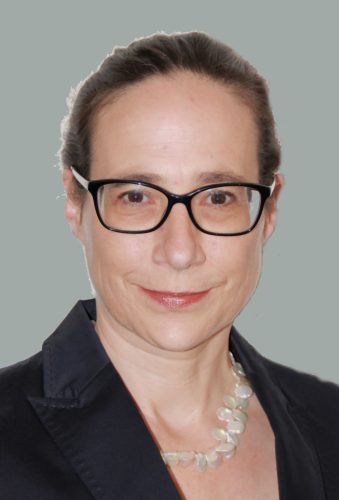
Take us through a day in your work life. What are some of the work habits you’ve developed over the years that help you maintain productivity?
On workdays, at 9 o’clock we have a set team meeting that we use to talk about the daily business together and about how we can support one another in special projects. Of course, there is also social exchange. In my department, teamwork is very important and lived in nearly every working minute. That helps us to be productive and to keep our spirits up — even in hard times with a large workload.
What motivated you to apply for a position at Karger?
As a trained linguist and social scientist, working in publishing — and in particular for a scientific publisher, disseminating knowledge and helping people — was the most obvious career choice to make. What motivated me to apply for a position at Karger was its long history as a family-owned business — where a common goal is easier to identify with and work towards.
What has been your experience during the remote working over the last two years?
After the transition phase, where I dearly missed seeing my team members in person and having some spontaneous, unscheduled chats, I could see more positive sides in remote working.
It’s easier to focus on your work when there are fewer disturbances, a daily commute of at least one hour (one way) seems like an horrid recollection of older times; thus, you can use your most productive hours directly for your work assignments.
What do you enjoy the most about your time at Karger?
Having found a great team and team leader in the SIV-Department, with new and interesting challenges nearly every minute of the day.
What would you like someone who’s interested in applying to Karger to know?
We are in the transition to an always faster-paced workplace. You should enjoy working and animating your colleagues and different teams, be ready to embrace innovation and new ideas — to work hard convincing different members of other departments and to see the positive sides of working together with different people in taskforces and project groups.
How do you switch off from a busy day at work?
After a long workday, I especially enjoy sports, such as running, swimming, and of course – with the start of spring – standup paddling with friends.
Are you interested in a career at Karger? Explore our current job opportunities at our job portal. Also, find out what Daniela does in the role as a “Human Resource Manager”.
How can you write a compelling paper? Or avoid having your paper rejected? Have you covered every step in your clinical research article? Scientific writing can be learned! And how to get published, too.
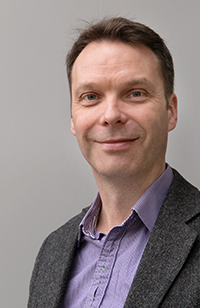
Karger supports young researchers in every step of their research project and for this reason we create products and services all along the research cycle. So Campus fits perfectly into our product portfolio. To learn more about the idea behind it, I interviewed Paul Lavender, Strategic Competence Lead of Education and Learning at Karger.
Paul, how did you come up with the idea of creating courses about getting published?
Campus is a collection of 10 courses to help authors in the health sciences get their papers published. The courses were created in response to demand from our customers — particularly librarians. Publishers are increasingly expected to provide not just articles in journals, but instructions on how to write these articles. Originally, we planned to run more onsite courses, but naturally the pandemic changed our approach.
Who will profit from these courses?
Health science researchers at all levels will find these courses valuable. For the early career researcher, the more basic courses on how to avoid rejection from a journal may be most beneficial. Senior researchers may enjoy topical courses in fast-moving fields, such as how to effectively market your research. Those who perform peer review for Karger will also have access to the courses on peer review — including our editorial board and partner publication boards.
What obstacles do researchers face in their publishing journey?
Actually, very many — which is why the majority of submitted papers in health science never go on to be published in any journal. Often this involves some form of incomplete or unclear presentation of the study findings.
Are there also obstacles in an earlier state of the research cycle?
Yes, the largest obstacles to publication are created before the publishing journey even begins — a poor or uninteresting study question and study methodology or conduct that invalidates the results of the study.
How does our courses address those?
We focus a lot on the importance of producing high-quality data that give insights into a clinically interesting question. This is a bit like using good ingredients with cooking — without good ingredients at the beginning, it’s nearly impossible to create anything tasty.
In addition, we stress that publishers want to publish high-quality work, and focus on strategies for authors to not only produce such work, but also to be seen to produce it. In other words, to make it easy for the publisher to accept their paper.
What is the university’s benefit?
Simply, if the students have a higher chance of being published successfully in a high-quality journal, their institution also benefits.
We have also tried to cover topics that senior lecturers would not have covered when they were students — such as preprints and social media. So, we hope that universities will use these to complement their existing curriculum or even as internal training for staff.
What’s your idea for the coming year? Will you add more courses?
We will have quarterly webinars for Campus students to discuss questions that they have submitted after completing a course. I’m very much looking forward to these.
We would love to expand Campus, but it may be that we go ‘deeper rather than wider’, so discussion forums/walls and more live events, rather than simply adding more courses.
What topics will they cover?
Students can submit ideas for upcoming courses, so I think we’ll just see where there’s a strong demand. I suspect we will see demand around hot topics such as open data, metaverse in science, etc., which is great, but may need to be micro-courses that can quickly be updated.
Which course do you like best? And why?
Any course that doesn’t have me in it! 😉 Seriously, it would be impossible to choose because each main instructor has brought their personality to the courses they have created: my colleagues Grainne, Sonja, Inês, and Beth. Sophie has done a great job compiling exercises and quizzes. I love each course and learned something from each one. I’m extremely proud what this team has achieved.
Learn more about Karger Campus.
We asked ourselves: What does Daniela Zimmermann do in her position as an “HR Manager”. We know that she interviews and hires people. But what else is part of her daily job? Let’s find out in the first interview of our “Day in the Life” blog series!
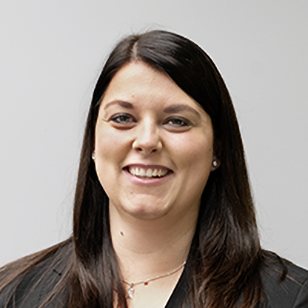
Take us through a day in your work life? What are some of the work habits you’ve developed over the years that help you maintain productivity?
My workdays can be quite different, i.e. there is no real typical workday, in HR you have to always be very flexible. I try to do work that requires a high degree of concentration in the mornings and to always leave myself enough latitude that I can also take care of the daily business on time as well.
What motivated you to apply for a position at Karger?
My entire previous professional experience was in the government and I was looking for a new challenge in the private sector. Then I came upon the job posting at Karger, which was a 100% match with my needs and career goals at the time.
What has been your experience during the remote working over the last two years?
Personally, I found the home office time very positive. HO had a very good effect on my work-life balance. Professionally, I’ve often been able to discharge my responsibilities more efficiently. Additionally digitalization has been radically transformed in the past two years in the HR field. However, I do miss the personal contact with my colleagues.
What do you enjoy the most about your time at Karger?
That your strengths are fostered and you’re always given new challenges. Depending on your position, you have a lot of individual responsibility and can work very independently. And you have the possibility to bring your own ideas to the table and depending on circumstances also to implement them.
What would you like someone who’s interested in applying to Karger to know?
You have to be aware that Karger is in the middle of a large change and for this reason it might not be the suitable workplace for every applicant. Also, you have to be able to deal with the fact that you cannot always find ready-made work solutions available and you have to be very flexible. The current moment is challenging but on the flip-side you also have the chance to make an impact and help shape things yourself.
Do you listen to music while you work? If yes, which type of music?
Yes, whenever I can I listen to music – I can’t live without music. When I’m working I’m usually listening to the radio. My taste in music is very broad and I listen to almost everything.
Are you interested in a career at Karger? Explore our current job opportunities at our job portal.
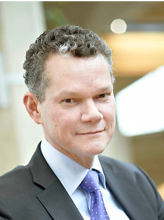
The history and success of Karger Publishing began with the booklet “Geburtshülfliches Vademecum” in 1890, which was the first publication in this field of obstetrics, followed by the journal that is now celebrating its 125th anniversary. Over the years, the journal evolved with the aim of always meeting the needs of the target group and is still going strong in the field today under the title: Gynecologic and Obstetric Investigation.
Editor in Chief Prof. Dr. med. Thomas M. D’Hooghe speaks with us in an exclusive interview.
You’ve been editor-in-chief for 20 years now. Can you tell us something about the journal’s changes during this last 20 years?
Internal changes: The digital process of handling a paper from submission through peer review to publication has become much easier, faster, and more effective. External changes: the submission of papers from China has increased in a very significant and impressive way.
Women in medicine, stillbirths, amenorrhea: the journal has always covered relevant (taboo) topics. Can you elaborate on the journal’s awareness of breaking taboos and how you did this?
I believe that GOI, with its specific heritage that is the subject of the GOI 125 special issue, has survived difficult years because of its focus on scientific quality. Any topic that deserves investigation related to obstetrics and gynecology is within its scope, which opens the opportunity to publish a wide diversity of content, including also research on taboo topics, or topics that may be culturally sensitive, as long as the rights of patients are respected, the content meets the currently applicable scientific standards of research and reporting, and related opinions are presented in a balanced way, based on transparent thinking, reasonable arguments and within the current ethical guidelines for medical care, data generation and medical-scientific publications.
Do you have a favorite article? Which one?
Not really, but I am very fond of what we have brought together in the GOI 125th celebration issue.
What will we read in GOI in the next 5 years?
Results of high-quality original data generation projects, reviews, and guidelines. I believe we will see major progress in Real World Evidence based on big data analysis and artificial intelligence, and will see more innovation based on exploratory hypothesis-generation randomized trials in centers of excellence, avoiding the cost and complexity of large multicenter trials. There is also growing interest in publishing patient-reported experiences, outcomes, and expectations as patients are becoming a more important driver of healthcare worldwide. Acceptance of papers will be based on a few essential criteria: what is the scientific question? Why is the question important (who cares?) and to what extent is it new? Has the right methodology been used, in the right way? Are results available in a transparent, unbiased, and understandable way? Do the discussion and conclusion match the results?
We are not only interested in publishing innovative breakthroughs in basic, translational, or clinical research, but are also interested in publishing negative results from studies that were designed and executed with high quality, to ensure that they get the recognition they deserve. Also, contributions representing novel insights, or important opinion or debate topics are welcome.
Thank you very much for this interesting interview!
Read the latest articles from the journal Gynecologic and Obstetric Investigation.
Mix branding, linguistics, and product PR and you’ll find Linda’s area of expertise at Karger. Schubert, Bach, and Debussy are her biggest musical idols, and she loves playing their compositions on her piano.
 Kimi Weibel is doing his apprenticeship at Karger as a commercial specialist. To learn about different units, he changes departments every half year and he is currently in the marketing team. Find out more about his ever-changing routine and much more.
Kimi Weibel is doing his apprenticeship at Karger as a commercial specialist. To learn about different units, he changes departments every half year and he is currently in the marketing team. Find out more about his ever-changing routine and much more.

 Setting daily goals, working in a startup-like atmosphere, and combining three lively kids and a job: Meet
Setting daily goals, working in a startup-like atmosphere, and combining three lively kids and a job: Meet  Take us through a day in your work life. What are some of the work habits you’ve developed over the years that help you maintain productivity?
Take us through a day in your work life. What are some of the work habits you’ve developed over the years that help you maintain productivity?
 Take us through a day in your work life. What are some of the work habits you’ve developed over the years that help you maintain productivity?
Take us through a day in your work life. What are some of the work habits you’ve developed over the years that help you maintain productivity?


